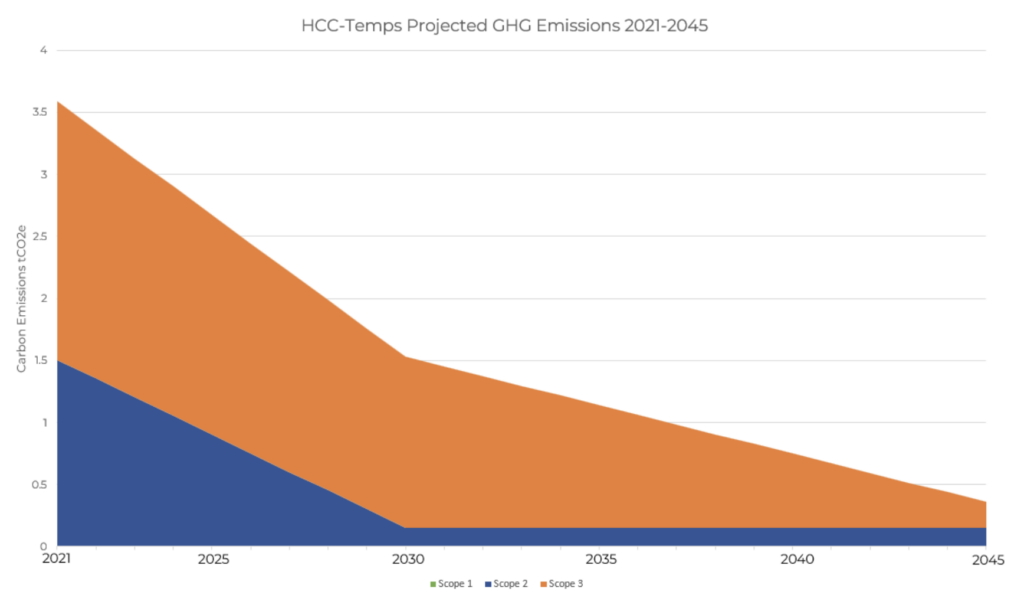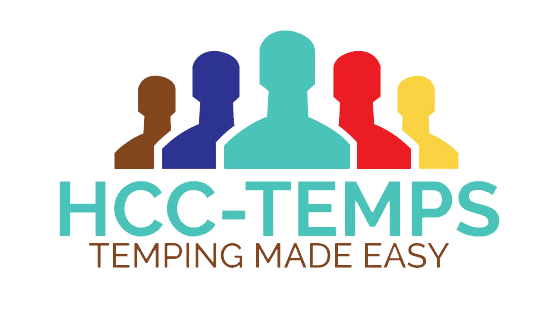Supplier name: HCC-Temps
Publication date: 23rd April 2024
Carbon Reduction Plan
for UK PPN 06/21
COMMITMENT TO ACHIEVING NET ZERO
HCC-Temps is committed to achieving Net Zero greenhouse gas (GHG) emissions by 2045.
BASELINE EMISSIONS FOOTPRINT
Baseline emissions are a record of the greenhouse gases that have been produced in the past and were produced before the introduction of any strategies to reduce emissions. Baseline emissions are the reference point against which emission reductions can be measured.
|
Baseline Year: 1st April 2022 – 31st March 2023 |
|
HCC-Temps’s carbon footprint baseline measurement was calculated for the period 1st April 2022 to 31st March 2023. The accompanying report focused on Scope 1 emissions (direct emissions) and Scope 2 emissions (indirect emissions) and the baseline of Scope 3 (indirect, value chain emissions) where available emitted by HCC-Temps. The data was provided by HCC-Temps and calculated by 5D Net Zero in accordance with the UK Government Greenhouse Gas (GHG) Conversion Factors for Company Reporting meeting ISO 14065 Standard. The report provided a baseline from which HCC-Temps can plan, adapt and focus its operations to negate and offset all greenhouse gas emissions. The measurements below have been rounded to the nearest hundredth decimal place. |
|
Baseline year emissions: 1st January 2021 – 31st December 2022 |
| EMISSIONS | TOTAL (tCO2e) |
| Scope 1 | None to report |
| Scope 2 UK Electricity | 1.51 tCO2e - 1.51 tCO2e |
| Scope 3 Upstream Distribution | 2.08 tCO2e - 0.00 tCO2e |
| Waste Disposal | - 0.03 tCO2e |
| Business Travel | - 0.13 tCO2e |
| Commuter Miles | - 0.24 tCO2e |
| Downstream Distribution | - none reported |
| Homeworking | - 1.69 tCO2e |
| Total Emissions | 3.59 tCO2e |
EMISSIONS REDUCTION TARGETS
In order to achieve Net Zero, HCC-Temps has adopted the following near-term carbon reduction targets.
- HCC-Temps is committed to decreasing Scope 1 and Scope 2 carbon emissions to 0.15 tCO2e by 2030. This is a reduction of approximately 90% from the baseline year.
- HCC-Temps is committed to decrease Scope 1, 2 and 3 emissions to 0.39 tCO2e by 2045. This is a reduction of approximately 90% from the baseline year.
HCC-Temps predicts their core operational carbon emissions will decrease over the next 5 years to 2.44 tCO2e, this is a total reduction of 31.86%. HCC Temps’s target GHG emissions for Scopes 1, 2, and 3 can be seen in the graph below:

PLANNED CARBON REDUCTION INITIATIVES
For HCC-Temps’s initial year of targeted reduction, the following environmental management measures and projects will be carried out to reduce the 2022/23 baseline. The carbon emission reduction achieved by these schemes equates to a minimum of 0.23 tCO2e, a 6.37% reduction against the 2023 baseline.
SCOPE 1
There are currently no reported emissions for Scope 1. HCC-Temps must try to ensure that this stays constant, especially with the move to their new office.
SCOPE 2
Scope 2 was 1.51 tCO2e because HCC-Temps are presumed to be on a non-renewable tariff. Switching to a renewable tariff would be the most efficient way of reducing these emissions, however, this will be a medium-term initiative. Therefore, for the first year, the focus must be on reducing consumption and increasing efficiencies. The following initiatives have been proposed.
UK Electricity
- Look to collect activity-based data, rather than spend to increase the accuracy of calculations
- Taking monthly meter KWh readings
- Encourage cultural and behavioural changes to reduce electricity usage and wasted energy where possible,
- Provide energy efficiency training,
- Use signage to remind employees to reduce energy consumption (e,g turning out lights),
- Encourage energy-efficient kitchen practices,
- Turn applications off rather than standby settings,
- Install energy-efficient devices,
- Switch to LED energy-saving lightbulbs,
- Install smart meters in both offices,
- Open conversations up and research surrounding switching to a renewable tariff,
- Switch to a renewable energy provider,
- Investigate installing renewable alternatives such as solar panels.
SCOPE 3
HCC-Temps’s Baseline Scope 3 reviewed six categories of emission sources: upstream distribution, waste disposal, business travel, commuter miles, downstream distribution and home working. Due to the nature of HCC-Temps’s operations, there was no data available to report on downstream distribution. During their first year, HCC-Temps should look to increase efficiencies in this area.
Upstream Distribution
- Choose products that are locally sourced,
- Consolidate shipments to reduce the number of deliveries,
- Thoughtful purchasing,
- Minimise unnecessary purchases,
- Reutilise items and promote the reuse of items that we already have.
Waste Management
- Identify areas of high waste at work,
- Run staff engagement on Reduce, Reuse, Recycle practices,
- Buy second-hand tech,
- Donate or sell old technology and usable resources,
- Check local standards and waste management schemes,
- Encourage behavioural change amongst staff and clients in offices,
- Increase signage to improve behavioural practices.
Business Travel
- Take public transport where possible,
- Conduct virtual meetings where possible.
Commuter Miles
- Maintain the company’s ‘hire locally’ values,
- Encourage employees to maintain the use of public transport and active travel when commuting,
- Introduce cycle to work scheme for employees.
FUTURE REPORTING
HCC-Temps should look to expand their reporting for Scope 3 to include the following categories.
- Water usage,
- Purchased goods and services,
- Fuel and energy-related activities.
